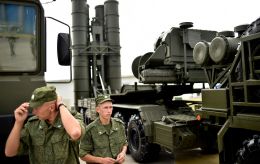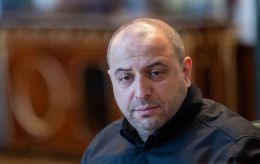From rags to riches: How Prigozhin rose in the Ukrainian war and defied Putin
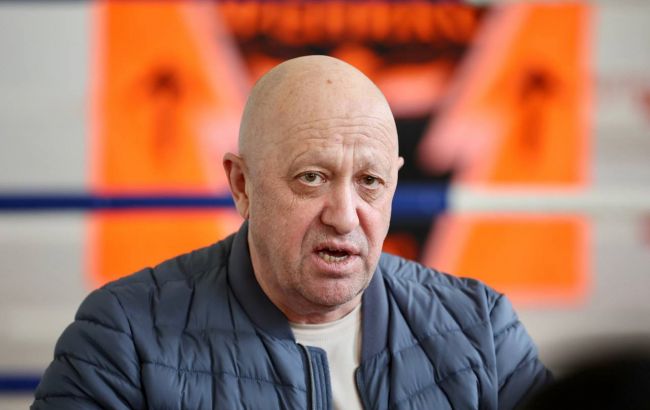 Evgeny Prigozhin, owner of Wagner group (Photo: Russian media)
Evgeny Prigozhin, owner of Wagner group (Photo: Russian media)
Yevgeny Prigozhin initiated an uprising in Russia. Since the beginning of the war, the shadow "Putin's chef" has been increasing his public activity. Western media referred to him as part of Putin's inner circle. Now he has challenged the military elite, declaring a "march on Moscow," while Putin labeled him and the PMC as coup plotters.
The owner of Wagner PMC, Yevgeny Prigozhin, has directly confronted the Russian Ministry of Defense and its head, Sergei Shoigu. On Friday, the leader of the Wagner Group claimed that the regular army had allegedly attacked their rear bases. Following this, the mercenaries headed to Rostov-on-Don, seizing the building of the Southern Military District. Later, according to Russian media reports, the PMC forces destroyed several Russian military helicopters that supposedly attacked them.
Russian dictator Vladimir Putin, in a video address on Saturday, called Wagner's actions a coup and a "stab in the back" to the country and its people. In response to this statement, Prigozhin implied that he had no intention of surrendering his weapons. He promised to go to Moscow until Shoigu and Chief of the General Staff Valery Gerasimov hand themselves over to him. Meanwhile, a counter-terrorism operation regime has been introduced in Moscow and the Moscow region.
By Saturday afternoon, news of explosions in Voronezh emerged, where an oil depot was attacked by a helicopter. There were also reports of a military aircraft accident in the Voronezh region. The Wagner Group itself bypassed the city center. Subsequently, videos started circulating online showing tanks and military vehicles heading towards the Lipetsk region, in the direction of Moscow.
The war in Ukraine is propelling Yevgeny Prigozhin's career to new heights. Within a few years, his name has become associated with numerous toxic stories. Prigozhin is considered the founder of the Wagner Group and the "troll factory" in Olgino. He is listed among the "most wanted criminals" by the FBI and is subject to US sanctions, including for attempting to interfere in American elections. Currently, his growing influence on the Russian president is being reported by reputable Western media.
While Prigozhin previously shied away from such fame, demanding search engines remove mentions of him, now he seems to be actively cultivating this image. He is associated with the radical wing of the "war party." He publicly criticizes the command and provides advice on how to conduct "special operations." Videos have seemingly surfaced online, showing him giving fiery speeches to recruit prisoners to the Ukrainian front. All of this appears to be aimed at gaining access to the Russian "top echelons" and, most importantly, catching the attention of Putin himself.
The way through the stomach
Prigozhin's multibillion-dollar empire whale is holding company, "Concord", organizes banquets for the Kremlin, owns restaurants in St. Petersburg and Moscow, and provides catering services to government institutions, the Russian army, and Moscow schools. Some affiliated companies are servicing military towns, repairing defense facilities, and constructing residential and office complexes.
The start of his entrepreneurial activities closely resembles the classic picture of the 90s in post-Soviet countries: former criminals often ventured into the restaurant business. Since around 1980, Prigozhin served time for fraud, gang robbery, and involving minors in prostitution.
Thanks to his youthful connections, he quickly climbed the ladder within three years, from selling hot dogs in St. Petersburg to opening his first restaurant. "Stara Tamozhnya," located in a warehouse on the ground floor of the Kunstkamera, became a favorite place for the elite. It was the city's first prestigious establishment where guests were treated to exotic dishes by those standards.
Over the next two years, he opened four more restaurants in St. Petersburg, with New Island being the most fashionable, located on a riverboat. There is a version that it was in one of these restaurants that Prigozhin and Putin first met when the latter worked in the local government.
By 2000, he was already hosting high-profile guests in his establishments, such as the prime minister, the head of the IMF, and governors. To win the favor of visitors of this caliber, Prigozhin often personally served them.
In 2001, Putin invited former French President Jacques Chirac to New Island. Prigozhin personally served them dishes. Later, the Kremlin leader hosted President George W. Bush on this riverboat, and in 2003, he celebrated his birthday there.
Prigozhin gradually rose, finding his way into Putin's circle through cunning paths since the 2000s. He managed to establish good relationships with Putin's personal driver and then his bodyguards. For example, with Viktor Zolotov, who has been heading the Russian National Guard since 2016, and with the current governor of the Tula region, Alexey Dyumin. This chain of useful acquaintances helped the former criminal from St. Petersburg rise and expand his business.
"By 2005, Prigozhin had virtually exclusive opportunities. Imagine a large hall, for example, the Gostiny Dvor, where the United Russia congresses take place. These halls are guarded by state authorities. And when you rented such a hall, you could only order catering from "Concord." Prices were higher there, but the quality was always excellent," recalls one businessman who left Russia.
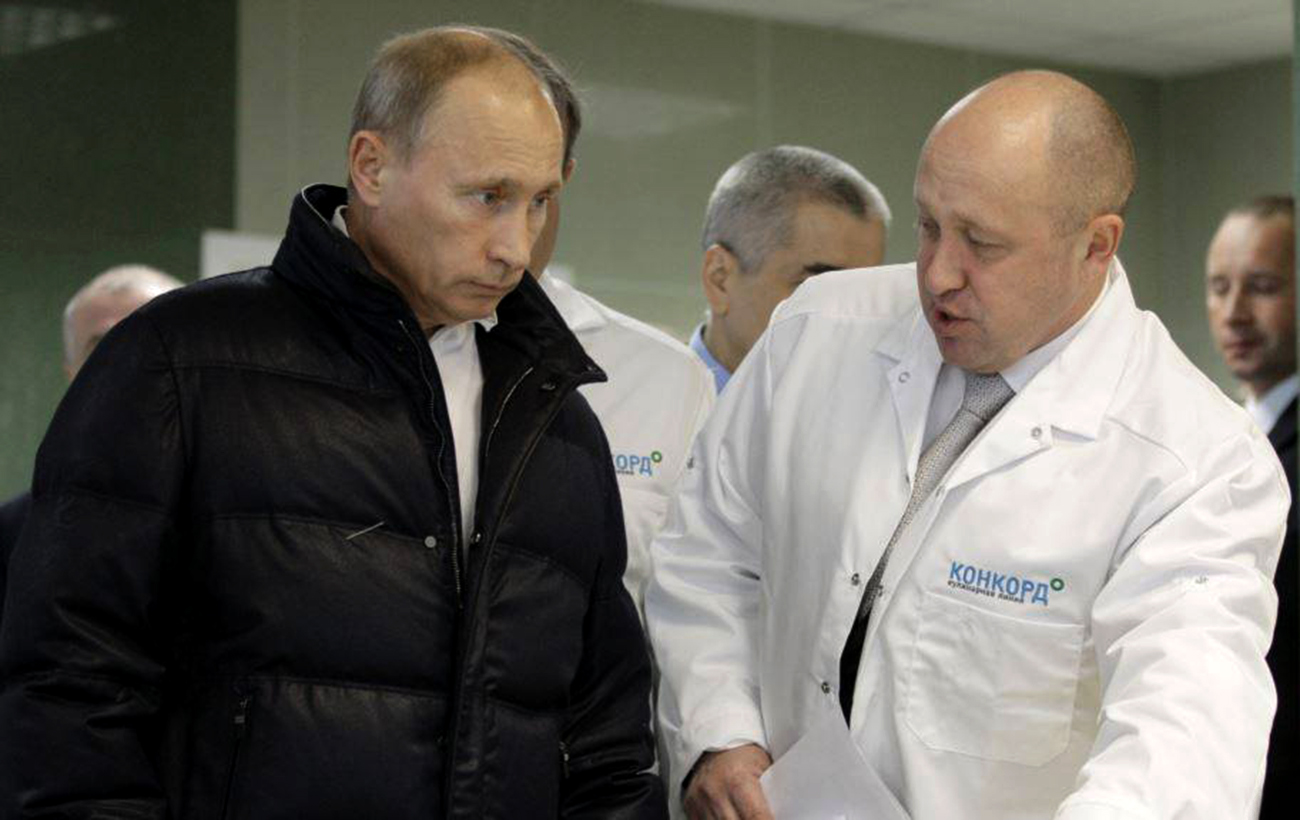 Prigozhin met Putin thanks to the catering business (Photo: Russian media)
Prigozhin met Putin thanks to the catering business (Photo: Russian media)
By 2010, Prigozhin had already gained a reputation as a chef close to the Kremlin. In 2008, he served at the festivities during Medvedev's inauguration, and four years later, during Putin's third term. When Putin served as the Russian prime minister, he visited the "Concord Culinary Line" factory on the outskirts of St. Petersburg for an "inspection tour," but soon after, this Prigozhin's project was closed."
Military affairs and first PR attempts
In 2009, a closed-type restaurant called "Cabinet 1237" opened in the Moscow House of Government. The prices there were very low, and the clientele consisted of high-ranking officials and their guests. Around the same time, the restaurant owner reached an agreement to open several other public catering establishments in the General Staff headquarters.
That's when Prigozhin shifted his business activities to the Russian capital. Starting in 2012, he began providing food to local schools, winning billion-dollar contracts, and later expanding to supply the Ministry of Emergency Situations. The next level was reached in the same year when the structures of "Concord" suddenly received over 90% of the contracts for catering to the Russian army. A month earlier, Sergei Shoigu took office as the Minister of Defense, who had previously served as the head of the Ministry of Emergency Situations.
The cooperation between "Concord" and the army started to expand. In addition to supplying food, they also took on contracts for servicing military units and cleaning barracks. The special privileges granted to Prigozhin are unlikely to be explained solely by his friendship with Shoigu. More likely, it is a result of his previous connections, which he established in St. Petersburg. In simpler terms, "the minister asked for it." There is a version that at least some of the contracts were obtained by "Concord" through Dyumin, who in 2015 served as the first deputy head of the Russian Ground Forces and later became the deputy minister of defense.
However, the opportunity to tap into budget flows still required payment. Prigozhin, known as "Putin's chef," was entrusted with dealing with private military companies (PMCs), which is a crime under Russian law. The idea of creating a private army matured in the Ministry of Defense around 2012 as an export project aligned with Russia's interests.
The General Staff needed mercenaries who could be used in military campaigns abroad under the principle of "they are not there." Putin approved this project, and recruitment of fighters began the following year, based at the Molkino facility in the Krasnodar Krai alongside the location of GRU special forces. The group received the working name "Wagner" after the call sign of its former military curator, Reserve Colonel Dmitry Utkin.
This delicate task was assigned to Prigozhin not only because of his criminal past. By that time, he had already solidified his image as a shadowy businessman loyal to Putin, capable of acting adventurously and forcefully. He covered a significant portion, if not all, of the costs for recruiting and training mercenaries, while the Ministry of Defense provided infrastructure and equipment. At least under this scheme, they worked until the war in Ukraine. It is unclear how things are currently arranged.
"Few people in the Russian power system are allowed to have their own army. Undoubtedly, it is under the control of the Kremlin, Putin, and the Russian special services, primarily the FSB. However, it was not a military person or someone from the special services who was authorized for this. He is an ordinary informant, as he was in prison. This is undoubtedly a great deal of trust," says Russian opposition figure Mark Feygin.
The Wagner Group first appeared during the Russian aggression in Donbas in 2014. They later fought in Syria, coordinating with Russian units and protecting Bashar al-Assad's interests. There have also been established facts of their involvement in combat operations in African and Latin American countries. They showed exceptional cruelty and committed crimes against the civilian population everywhere they went. After Russia's large-scale attack, the Wagner Group was deployed to eastern Ukraine. Currently, most of them are concentrated in the Donetsk region.
"The backbone, the command of the PMC, consists of former soldiers from Russian special forces units. They are professional in terms of operation planning. However, the mobilized convicts under their command, due to the lack of proper training and motivation, cannot effectively carry out offensive or defensive actions," explained Andrii Cherniak, representative of the Defense Intelligence of Ukraine.
Another source in the security services explained that during battles, they push the convict-Wagner fighters to the frontlines because they are expendable, while the professional members of the PMC are highly valued. Behind them there are the second echelon-blocking units that prevent the mercenaries from retreating, threatening them with execution.
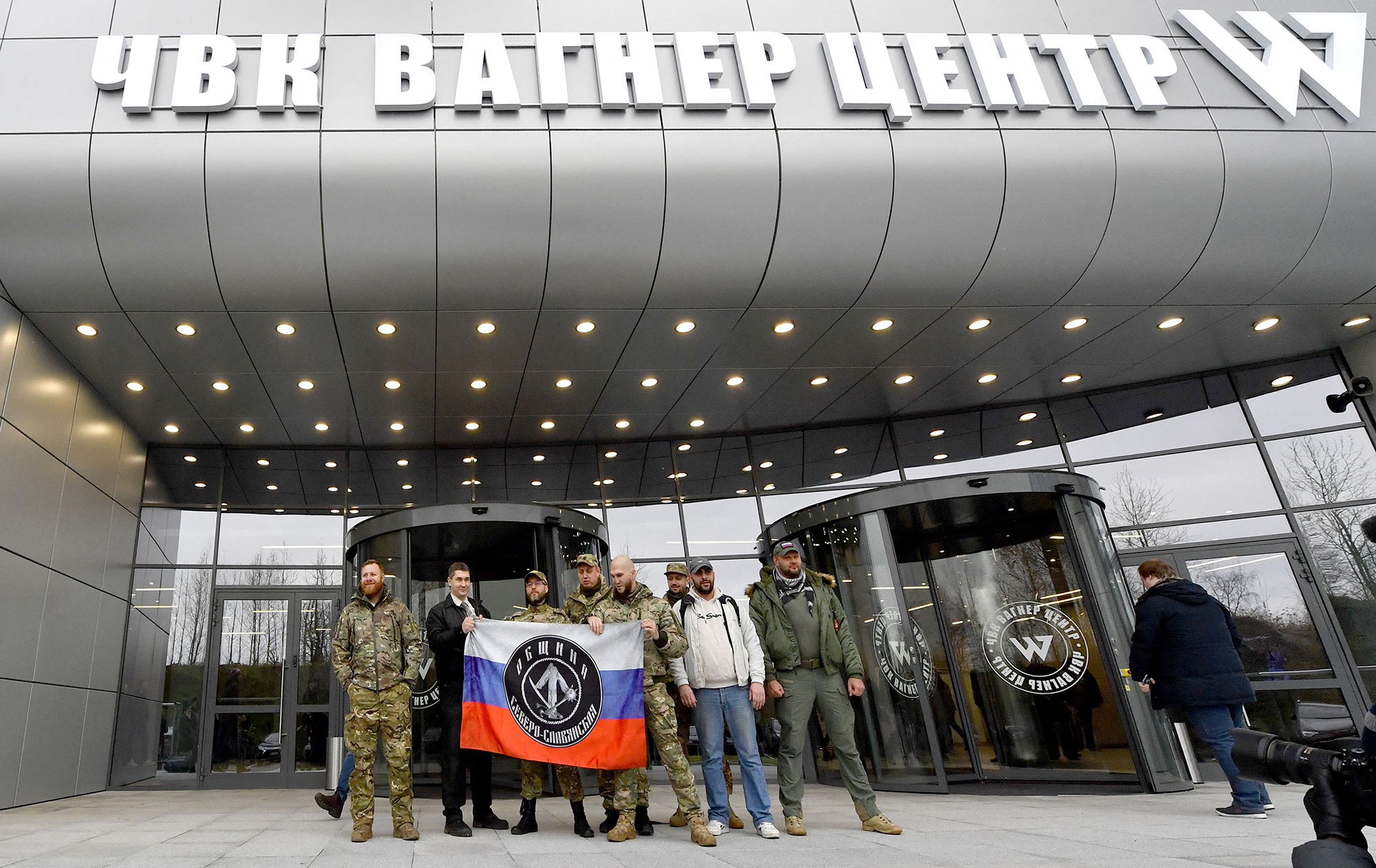
The PMC recruits prisoners all over Russia (Photo: Russian media)
Through his connection with the Wagner PMC, Prigozhin has attracted the attention of US authorities since 2016. However, this is not the only reason why American law enforcement became interested in him. The companies associated with him, RIA FAN and the "Internet Research Agency," are accused of interfering in US elections, particularly in the electoral campaigns of Hillary Clinton and Donald Trump. These two entities are part of a larger "troll factory" that has been conducting bot attacks and online campaigns to discredit figures who are critical of the Russian government since around 2013. The "New Agency of Kharkiv" and "Kyiv Media" were also connected to this "factory."
Unlike the Wagner Group, Prigsozhin's creation of these "virtual forces" was not sanctioned from above. It was his personal initiative to demonstrate his effectiveness and gain favor with the Kremlin. According to numerous journalistic investigations, his trolls worked rather clumsily and were unlikely to have had any significant influence.
However, the side effect of their work was that the project gained widespread attention, and people started talking about Prigozhin. At that time, "Putin's chef" was just beginning to explore the power of media and public relations. In 2019, he became the head of the supervisory board of the media group "Patriot," which includes some organizations previously associated with the "troll factory."
In the right place at the right time
Before the war in Ukraine, the head of Wagner lost his former proximity to the country's top officials. According to "Meduza," one of the reasons was the support of St. Petersburg Governor Alexander Beglov by some members of the Russian president's administration in his conflict with Prigozhin.
Conflicts arose between them because the local authorities did not allow the entrepreneur to participate in many lucrative state contracts. This includes the development project of the "Gorskaya" tourist zone on the shores of the Gulf of Finland. Recently, the city building supervision in St. Petersburg refused to issue a permit for the opening of the municipal "Wagner Center." In response, Prigozhin wrote another statement to the FSB and the prosecutor's office, requesting an investigation into Beglov for state treason.
Furthermore, in recent years, he has also clashed with Shoigu, dating back to their time in Syria during military operations. They had different views on how the army should conduct warfare. Former Wagner contractor Alexander Zlodeyev revealed that Shoigu was displeased when Putin praised Prigozhin instead of him after the capture of Palmyra.
The second incident involves significant losses suffered by Wagner PMC near Khasham in the vicinity of gas fields when mercenaries supposedly carried out a private order for a Syrian businessman and the Assad government. The Russian Ministry of Defense told NATO that these were not their fighters. As a result, the Wagner Group came under several hours of bombardment by the US Air Force. Prigozhin was angry with the military command, while they, in turn, were dissatisfied with the lawlessness of the PMC leadership.
 Prigozhin has been having conflict with Shoigu for several years already. (Photo: Getty Images)
Prigozhin has been having conflict with Shoigu for several years already. (Photo: Getty Images)
Around the same time, "Concord" and its affiliated structures began to be excluded from a significant number of defense orders. This can be partly explained by Shoigu's desire to appropriate those funds, considering Prigozhin's "experience" working with the Ministry of Emergency Situations. It is also noteworthy that the number of contracts between the Ministry of Defense and "Concord" started to decline rapidly after Dumin was appointed as the governor of the Tula region. As of 2022, the department still signs contracts with "Concord," but on a much smaller scale than in 2015, for example.
The fourth notable event is that the Ministry of Defense involved the Wagner Group in the war only in March when it became evident that the regular army was struggling. At the same time, another private company directly associated with Shoigu's department, "Redut," was also deployed to Ukraine from the first days of the invasion.
Prihodin's services became useful once again. Thanks to the participation of the Wagner Group in the war against Ukraine, he managed to regain favor with the "court." The Wagner mercenaries "distinguished themselves" during the occupation of Popasna, which they practically razed to the ground. In July, after capturing almost the entire territory of the Luhansk region, Putin even awarded Prigozhin the title of "Hero of Russia." He appeared with the star on his chest at several events and recruited prisoners for the war.
The effectiveness and combat capability of the Wagner Group are greatly exaggerated. While professionals may have served there many years ago, the lack of fighters has led to a relaxed selection process. According to the information from the UK Ministry of Defense, the PMC even recruits prisoners with serious illnesses, including HIV and hepatitis C. Looking at the front lines, the Wagner Group cannot demonstrate any "success" in the Donetsk region.
Nevertheless, Putin apparently approves of the PMC's involvement in the war, as well as Prigozhin's initiative. He himself tries to maintain this favor by increasing his media presence and further enhancing his "capitalization." In September, he publicly acknowledged his involvement with the Wagner Group for the first time, even though he previously sued journalists who wrote about it. Now he publicly comments on the events on the front lines in a manner that pleases Putin.
At the initiative of "Putin's chef," defensive lines known as the "Wagner Line" or the "Prigozhin Line" are being constructed in the Belgorod region. Similar structures are being built in the occupied part of the Luhansk region. The Wagner Group leader advocates for the creation of a people's militia in the border regions, something resembling Ukraine's territorial defense.
"The fact that he has achieved such favor and such extensive opportunities to act, including engaging in warfare, is primarily explained by his closeness to Putin and his character. Due to his delinquency and criminal nature, he acts very boldly. Putin loves such people. He is not cautious. He can kill or not kill. There are no tasks he wouldn't undertake," believes Feygin.
The Washington Post, citing its sources, reported that Prigozhin allegedly directly pointed out the failures of Shoigu and the Ministry of Defense in the war to Putin. It is noteworthy that the Kremlin did not retaliate against either Prigozhin or another like-minded individual, Kadyrov, for criticizing the military leadership. This suggests that the minister may indeed have fallen out of favor with the Russian president.
It is not excluded that Prigozhin would not mind replacing him with a more friendly figure, such as his associate Dyumin, who was previously rumored to be in line for Shoigu's position. However, Prigozhin's influence in the Kremlin is currently not significant enough to appoint a defense minister who is loyal to him.
He is not considered a full-fledged member of Putin's inner circle. Prigozhin is not his childhood friend, did not work with him in the St. Petersburg mayor's office, nor was he part of the "Ozero" cooperative. Most likely, he simply aspires to become one, trying to demonstrate his maximum usefulness and full support for the ideas cherished by the Russian president. His attempts to portray the Wagner Group as a loyal and efficient force resemble a demonstration to Putin that they could serve as his personal protection in case of internal conflicts, akin to a "praetorian guard."
The war in Ukraine itself is not of interest to Prigozhin. For him, it is merely a tool for the realization of his own ambitions of power. Everything seems to indicate that his ambition is to enter the highest echelons of Russian elites: the close oligarchs of Putin who influence decision-making and secure substantial contracts from the state budget. After all, supplying food to state institutions is not the same as building a bridge, which usually goes to close friends of the Russian president.
